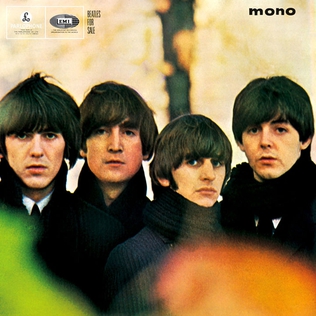- The Beatles, exhausted by the rigors of Beatlemania, were starting to get worn out, resulting in some negative music.
- The music itself was still pretty awesome; the Beatles were approaching yet another creative peak, despite or perhaps because of the stress.
My personal favourite is the much-maligned "Mr. Moonlight," which is if nothing else the most interesting. I love the vocal interactions built into the song, which suits the Beatles so well, the slight but jittery guitar work, and that muddy-sounding organ solo. And yet everyone else hates it.
As well, there are a few original tracks on Beatles For Sale that are not considered exceptional. You won't find too many people placing "Every Little Thing" on top of their list of favourite Beatles songs, same with "What You're Doing." And yet the truth about the Beatles at this point was that, for what they were putting out, even their less notable songs are still pretty awesome. "What You're Doing" has a sublime, muscular riff that perfectly sits in the mid-60s vibe. "Every Little Thing" has a good chorus, if not a hit-caliber one, bolstered by that little dramatic drumroll there. They are, it's said, "better recordings than songs." Not great on the page but really come alive in the studio. "I'll Follow The Sun" gets some love - Paul was responsible for all three of these songs, and this one apparently even dates back to the early years. I find that odd, since its light, sensitive lyrical matter, about moving on confidently after a break-up, sounds very "current" for the Beatles at the time of this album. While John was gaining a gift for introspection, Paul was mastering the art of writing a catch-all, the exact right level of vagueness appropriate for a pop song.
"Eight Days a Week" wasn't released as a single in the UK but was just too obviously a hit not to be one in the States. That's the kind of song you want all over the radio, with its glorious fade-in (who even does that?) It sounds like it's coming up over the horizon, a big towering thing. Lyrically and structurally, it's classic Beatles, catchy and pleasant as all hell, with a few interesting quirks to set it apart. I've also always loved the way they deliver the title phrase, keeping the pitch sharp, maintaining some giddyness. It's an oasis of positivity on this otherwise bleak album.
Bleak, I say. Not that this is a bad thing. Lennon's contributions, the oft-discussed opening trilogy of "No Reply," "I'm a Loser," and "Baby's in Black" as well as "I Don't Want To Spoil The Party," all explore negative emotions and occurrences, like rejection, doubt, frustration, and paranoia. It's hard to tell which is the best. "No Reply" has those dramatic crashes under the title phrase. "I'm a Loser" has one of the single best choruses, "I'm a loser / And I've lost someone who's near to me / I'm a loser / And I'm not what I appear to be." which is maybe a more revealing statement than was usual for a pop song.
And maybe the greatness of it was that it was still pop music. That these were still technically the friendly moptops who had only just taken America by storm less than a year earlier. In some ways it's like meeting someone really nice at a party, but an hour later they're spilling their guts about their recent party (and hey, I just told you there was a song about exactly that.) And yet somehow, they're so friendly, and charming, you hang on every word. These songs are easy to get caught up in, never overly melodramatic or bogged down by the negativity that runs through them. They aren't good because they're darker: they're good while being darker.
This is where it becomes important that the Beatles write their own material. From the shellshocked-looking cover to the title, the Beatles clearly enjoyed kidding their image a bit, apparently aware that people buying their albums were, in a sense, checking in with them every few months, and if they were being honest, this is how they felt: not like superstars but like refugees. They could form that kind of dialogue with their audience, even if it was primarily screaming girls. Maybe they knew I'd still be here 50 years later overanalyzing it. That level of openness and "authenticity" would be a defining aspect of rock and roll from then on. Rockers who don't somehow seem genuine don't get taken as seriously as the ones that do. That's why the Monkees aren't in the hall of fame.
Buy This Album: iTunes Canada // iTunes USA // Amazon.ca


No comments:
Post a Comment